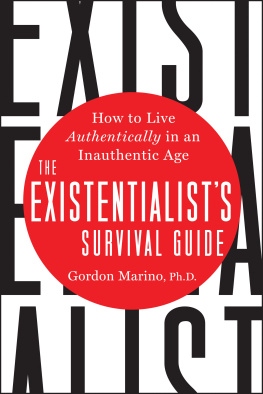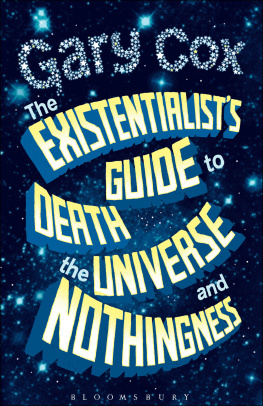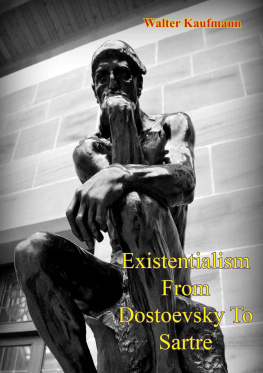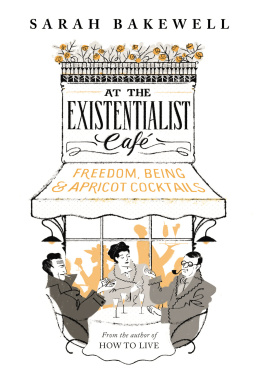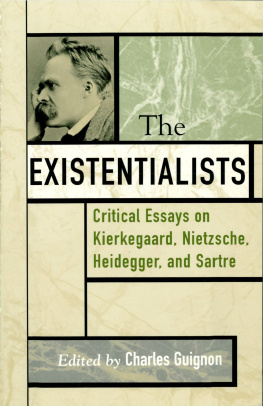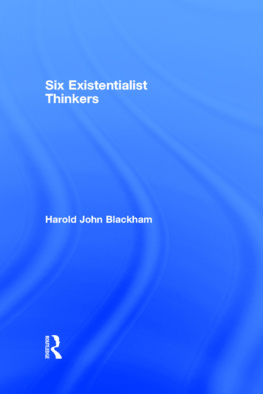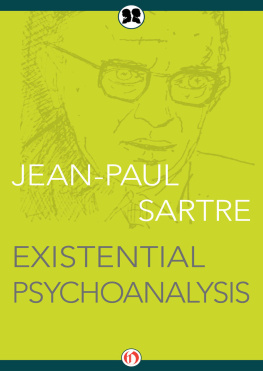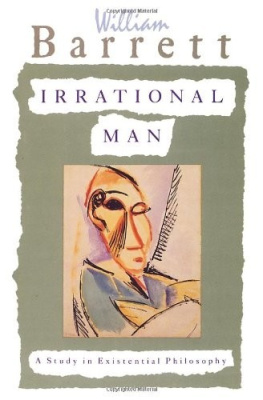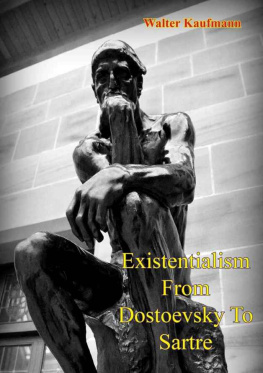I want this to be an honest book. No disrespect to other scribblers and beekeepers of ideas, but honest in the sense that instead of serving up re-rehearsed intellectual history, I want to believe that I have absorbed and can pass along some wisdom from Sren Kierkegaard and other existentialists whom I spent much of my adult life studying. He who studies with a philosopher, the Stoic Seneca (4BCAD65) tells us, should take home with him some good thing every day; he should daily return home a sounder man, or on the way to becoming sounder. The same holds for someone like me who has spent decades walking with Kierkegaard and those who followed him. Either I was made sounder or I was wasting my time. If the former, then I ought to be able to pass on a few nuggets of wisdom, and if the latter, then I should remain mum or restrict myself to simply charting the history of existential ideas.
Existentialism is a state in the union of philosophy, and philosophy is the love of wisdomas opposed to knowledgewhere wisdom might be understood as a pretheoretical understanding of how to live. At the end that was the beginning of this book, I started to feel that, neurotic as I am, I didnt have anything worthwhile to impart, even secondhand. Yes, I know: there is nothing more irksome than an author writing about how hard it was for him or her to write their book. As though the word processor were Aleppo! But when I first sat at the keyboard, the blank page put me on the canvas, or rather in bed. Personally speaking, the attempt to write has always seemed like a confrontation with the void inside me, with my own emptiness.
For all my blessings, Im a relatively haunted human being. In fact, I would have to place myself on the rather miserable end of the spectrum. Clinically speaking, I am a card-carrying depressive. To be fair to myself, I have tried to be a kind person. At least since my borderline-criminal days, I have made substantial efforts to nurture the lives of my students and others, but I am no more a moral hero or sage than I am a contented individual who sleeps soundly and rises in the morning eager to embrace the promises of the day.
My aim in this book is to articulate the life-enhancing insights of the existentialists. And yet their shimmering genius aside, the cast of characters introduced in these pages do not have much better grades on the happiness or moral curve than I do. In truth, to a man and woman, the existentialists are a veritable cadre of neurotics. So, who are theyor me, their apostleto pass along life prescriptions?
At this juncture, you would be right to prepare for an on the other hand or but still, as in although I have undermined the very idea of this book, please read on! Well, youre right: there is a but still, for all my foibles and problems the existentialists, and Sren Kierkegaard (18131855) in particular, helped me to endure. At the risk of seeming histrionic, there was a time when Kierkegaard grabbed me by the shoulder and pulled me back from the crossbeam and rope.
Kierkegaard, Nietzsche, Dostoyevsky, and other existentialist thinkers faced life unblinkered and were nevertheless able to lead authentic lives and keep their heads and hearts intact. More than any other group of philosophers, they understood what we are up against in ourselves, that is, moods such as anxiety, depression, and the fear of death. Today, these inner perturbations are usually classified in medicalizing terms. But in their own inimitable, indirect manner, the existentialists remind of us of another perspective on these and other troublesome emotions. In the pages that follow, I will try to recover those reminders.
Kierkegaard, Nietzsche, Dostoyevsky, and other existentialist thinkers faced life unblinkered and were nevertheless able to lead authentic lives and keep their hearts intact.
I am sure there are readers familiar with that exclamation point of an expression existential threat, but unfamiliar with existentialism. For those who might be tilting their heads, asking, What is existentialism? a survey of the movement is in order.
Existentialists have been perennially concerned with questions about the very meaning of life, questions that tend to come to the fore when we have become unmoored from our everyday anchorage.
The existentialism that helped sustain me is personal in nature. Representatives of this approach think about existence from the inside out, from a first-person perspective. There is much dispute about the roster of this motley crew of thinkers. With the exception of Jean-Paul Sartre (19051980), who was the only one to accept the label and only for a short period at that, scholars cannot agree on an official muster list. For instance, I edited Existentialism: The Essential Writings, an anthology that included Albert Camus (19131960), who, for reasons to be discussed, seemed a no-brainer, and appears in virtually every such collection. Then I thumbed through David Coopers excellent Existentialism, only to learn that the venerable professor denies that Camus is an existentialist because unlike the rest of our writers, it is not at all his aim to reduce or overcome a sense of alienation or separateness from the world. Strange, because I would have thought that the sheer attempt to articulate this sense of alienation would have been enough to warrant membership in the club.
Further complicating the issue, many of the writers classified under that heading did not in any way think of themselves as philosophers, even though for the most part youll only find courses on existentialism in philosophy departments. For instance, it would be fair to tab Henry David Thoreau (18171862), a contemporary of Kierkegaard, an existentialist even though he is rarely included as one in anthologies or course syllabi.
Though we are without a body of unifying creedal convictions, a set of themes links this diverse group of intellectual pirates. Existentialists have been perennially concerned with questions about the very meaning of life, questions that tend to come to the fore when we have become unmoored from our everyday anchorage. It has been argued that the roots of existentialism were planted as science began to displace faith in what Max Weber termed the disenchantment of nature. Blame it on Copernicus, who awoke humankind from the dream that the Garden of Eden sits at the center of the earth, earth at the center of the universe with God out there watching the play of human history as though in a theater. Another cause for existential head scratching was the emergence of nation-states in Western Europe, which brought with it the breakdown of the tidy feudal ordering of society, where everyone understood his or her place both in the cosmos and society.
In the modern era, periods of cataclysms have always been a boon to existentialism. Following the abattoir of the First World War, many turned to writers who grasped that life was not dictated by reason, to help them understand, or at least come to grips with, the madness. Interest in existentialism rocketed after World War II and the Holocaust, when humankind once again proved what it is capable of.
And yet, in the mid-twentieth century, at the same time that existentialism was gaining popularity, analytic philosophy ruled the roost in Anglo-American universities. This mode of inquiry developed on the back of logical positivism, a movement that began in Austria with Rudolf Carnap and the conviction that any proposition that was not testable was not worth thinking about. Advances in formal logic also gave a fillip to this hard-nosed mentality, one that placed maniacal stress on logical form and clarity.
If we cleave to the biblical distinction between word and spirit, the spirit of the analytic philosophy was to cleanse philosophy of anything that smacked of metaphysics, unanswerable questions about the nature and foundations of being itself. So far as the fundamentalists of this school of thought were concerned, anything that could not be defined clearly was mumbo jumbo better left alone or to the poets.

